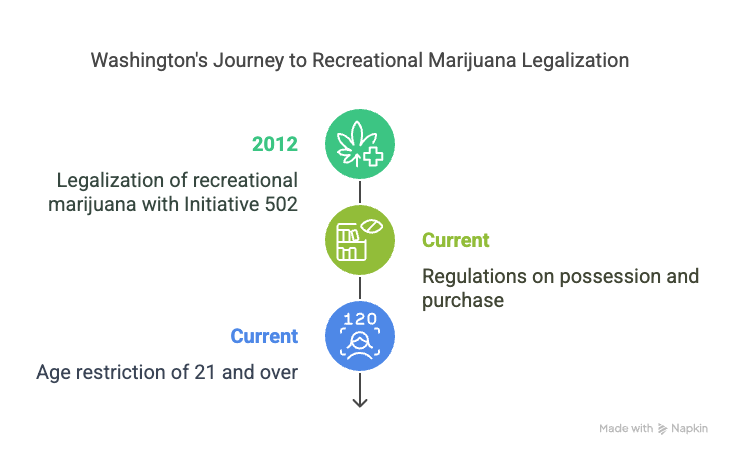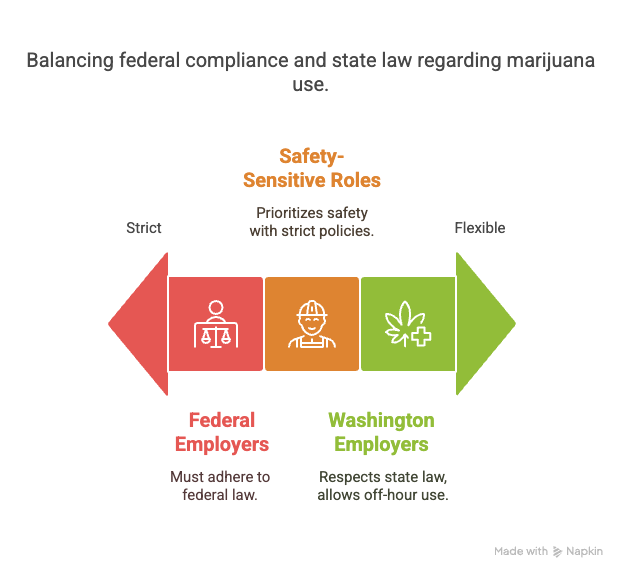Understanding the complex interplay between Washington's cannabis laws and employment screening can be daunting for both employers and employees. With recreational marijuana legalized in Washington state, it's crucial to grasp how this affects employment screening processes and drug testing policies. This guide outlines key aspects of Washington cannabis employment screening, exploring both employer and employee perspectives.
Key Takeaways
- Washington's legalization of recreational marijuana challenges both employers and employees to navigate the complexities of conflicting state and federal laws.
- Employers must carefully balance maintaining federally mandated policies with respecting state laws when crafting workplace drug policies.
- THC testing remains a critical component of employment screening, especially for safety-sensitive roles, despite the legality of recreational marijuana.
- Washington state law doesn't require workplace accommodation for cannabis use, leaving employees vulnerable to positive THC test-related job actions.
- Regularly revisiting and updating drug policies is crucial for employers to ensure compliance and fairness in light of evolving cannabis laws.
Introduction
With the legalization of recreational marijuana, Washington state leads the charge in redefining employment screening practices. As marijuana laws shift, understanding their impact on employment becomes essential. Employers and employees alike must navigate a new terrain shaped by legalization.
Legally, Washington permits adults over 21 to use and possess marijuana. However, this state law doesn't align with federal regulations, which still classify marijuana as illegal. This discrepancy crafts a complex setting for employment where compliance with both sets of laws is necessary.
This article aims to untangle the complexities of cannabis employment screening in Washington. We'll explore how recreational use affects workplace policies, the legal parameters of drug testing, and the strategies employers can adopt to remain compliant. Understanding these elements is crucial for safeguarding both employee rights and employer interests.
Washington's Recreational Marijuana Laws
Washington opened a new chapter in cannabis legislation by legalizing recreational marijuana in 2012 with Initiative 502. This move allowed adults aged 21 and over to use marijuana legally. Before this, marijuana was only permissible for medical use under specific conditions. Initiative 502 changed the game's rules, making Washington one of the first states to normalize recreational use.

The current laws allow adults to possess up to one ounce of marijuana flower, 16 ounces of marijuana-infused product in solid form, 72 ounces in liquid form, or seven grams of marijuana concentrate. You can purchase these products from licensed retailers, which are regulated to prevent sales to minors and ensure product safety.
Age restriction is straightforward: you must be 21 or older to purchase or possess marijuana. This aligns closely with alcohol laws, providing a consistent framework for young adults.
Understanding these laws is crucial for anyone living or working in Washington, and they directly impact employment policies. Employers must navigate these legal waters carefully, balancing state freedoms with federal constraints. One question you might ask is how these allowances affect workplace policies, especially when federal laws still classify marijuana as illegal. This complex legal environment pushes employers and employees toward a deeper understanding of marijuana's role not just in society, but also in the workplace.
Impact of Marijuana Legalization on Employment Screening
Federal law still categorizes marijuana as an illegal substance, creating tension with state laws like those in Washington, where recreational use is legal. This conflict places employers in a tricky spot. Federal employers or those receiving federal contracts must comply with federal law. Employers need to balance maintaining compliance with federal mandates and respecting state laws. Your workplace policies must reflect this balance.

Consider safety-sensitive positions. Employees operating heavy machinery or working in hazardous environments pose a unique challenge. For these roles, employers often establish strict drug use policies to ensure workplace safety. While respect for state laws is important, safety cannot be compromised.
Washington's law doesn't protect employees from being tested or from being disciplined if they test positive for marijuana, even during off-hour use. If youâre an employer, think about your company's stance on cannabis usage and policy enforcement. Does your policy align properly across state and federal lines? For instance, maintaining clear communication about your companyâs drug use policies is vital in avoiding legal disputes.
Employers should also think about productivity. Cannabis use can impact an individual's work performance. Donât let personal biases shape your policies. Instead, rely on objective criteria to evaluate performance.
The legalization of marijuana is an evolving landscape. Employers should remain vigilant and adaptable to changes. Have you recently reviewed your drug policies? If not, it might be time to revisit them to ensure they meet both legal requirements and the needs of your workplace.
Employer Drug Policies in Washington
Creating a drug policy requires careful consideration of both state and federal laws. Washington law allows recreational marijuana, but that doesnât mean your workplace has to permit its use. Employers can and should create clear drug policies that reflect their companyâs values and safety requirements.
Creating Drug Policies: Start by determining what zero-tolerance means for you. For safety-sensitive roles, a stricter policy might be necessary. Define what constitutes a violation and outline the consequences clearly. Include stipulations regarding on-the-job impairment and off-the-clock usage, especially in roles where safety is paramount.
Drug-Free Workplace Programs: While Washington allows recreational marijuana use, employers can still implement drug-free workplace programs. These programs maintain legality by focusing on safety and productivity, rather than legal cannabis use outside of working hours. Be clear about what "drug-free" means within your workplace. Make sure the program complies with the federal Drug-Free Workplace Act if youâre a federal contractor or receive federal grants.
Specific Policies Addressing Cannabis Use: Case in point, a Seattle-based tech company decided to revise its policies to allow off-duty cannabis use. However, they maintained strict guidelines for impairment during work hours. In contrast, a construction firm might opt for a no-tolerance policy across the board due to the hazardous nature of their work. Always consider tailoring your approach to fit the industry and the specific roles within your organization.
Engage legal counsel to review any new policy. This ensures you meet legal standards and protect your company from potential lawsuits. Communicate the updated policy to all employees, possibly integrating it into onboarding and training processes. Clear, consistent messaging minimizes confusion and legal risks. How will your policy balance legality and workplace safety?
THC Testing in Washington
THC testing in Washington employment screening hinges on a balance of legal rights and responsibilities. Employers often use different types of tests, like urine, saliva, and hair, each with varying detection periods. Urine tests are the most common, detecting THC from a few days up to a month. Saliva tests offer a shorter detection window but are less intrusive. Hair tests can reveal usage over weeks, though they're less common due to cost and controversy over reliability.
Employers can test for THC under specific conditions. If your job involves safety-sensitive tasks, expect regular testing. Pre-employment screenings are typical for many positions, helping employers assess potential risks. In some sectors, like transportation, testing is federally mandated. Remember, an employer must have a clearly communicated policy outlining when and how testing occurs.
Your rights as an employee are not sidelined. Consenting to a THC test should be informed and voluntary, barring certain job requirements. You have a right to know the types of tests administered and their implications. False positives are possible, and you should have access to contest results or provide explanations for any positive findings. Privacy is crucial; your results should remain confidential, shared only on a need-to-know basis within the company.
Overall, while Washington's legalization of recreational marijuana has changed the landscape, THC testing remains a vital part of employment screening, balancing workplace safety and individual rights.
Legal Rights and Protections for Employees
Washington state law provides certain protections for employees who use cannabis legally. However, these protections are not absolute. While state law permits recreational marijuana use, it does not require employers to accommodate cannabis use in the workplace. This means you might legally consume cannabis outside work, but your employer can still enforce a drug-free workplace policy.
The Washington Law Against Discrimination (WLAD) does not consider marijuana use a protected class. Therefore, being terminated for a positive THC test may not be seen as discriminatory under state law. Yet, Washington's Initiative 502, which legalized recreational cannabis, does offer some level of protection by legalizing possession in specific amounts for adults.
The Equal Employment Opportunity Commission (EEOC) provides guidelines to ensure fair employment practices. While cannabis itself isn't protected under these guidelines, employers must ensure their testing practices do not result in discrimination against employees based on race, color, national origin, sex, or religion. It's crucial for employers to apply drug testing policies consistently to all employees to avoid violations.
If you're an employee, navigating conflicts between your employerâs drug policy and your legal cannabis use can be challenging. Start by understanding your workplace's specific drug policies. If you believe your rights have been violated, consider seeking advice from an employment attorney familiar with Washington stateâs drug laws.
Always communicate openly with your employer about prescription medications and medical conditions that might require accommodation. However, remember that employers are not obligated to permit cannabis use even for medical purposes. The balance between state legality and workplace policy remains a complex issue that requires careful consideration on both sides.
Case Studies: Real-world Applications
Real-world applications provide valuable insights into how Washington-based companies tackle cannabis employment screening. Consider the case of a large tech firm in Seattle. After legalization, they revised their drug policies to focus less on punitive measures and more on maintaining performance and safety standards. Employees were no longer required to undergo routine THC testing, except in cases of incidents suggesting impairment or decreased productivity. This change led them to retain top talent who might otherwise have been disqualified due to past or legal off-duty use.
A contrasting scenario unfolded at a mid-sized construction company. Faced with strict safety compliance demands, they maintained a zero-tolerance policy, including regular THC testing. In a situation where a long-term employee tested positive, the company faced backlash for not considering recreational use legality. The result was a costly legal battle and a reevaluation of their policy to incorporate specific testing triggers rather than blanket tests.
From these cases, employers can learn to tailor policies to their unique industry needs while considering legal recreational use. Balancing safety with compassion can prevent unnecessary turnover and legal complications. Employees should understand the companyâs stance before joining and communicate openly about any conflicts that might arise. Each case reinforces the importance of clarity, fairness, and adaptability in policy formation.
Best Practices for Employers
Policy clarity is king. Start by crafting a straightforward cannabis-use policy. Ensure it aligns with Washington laws while addressing your specific workplace needs. Keep it clearâavoid ambiguity that could lead to misunderstandings.
Communication is as crucial as policy development. Distribute the policy to all employees and discuss it in meetings. Use plain language to explain it. Ensure everyone understands the expectations and consequences related to cannabis use.
Training staff is not optional. Educate HR and management on marijuana laws and their implications. Knowledgeable staff can address issues confidently and consistently. Regular training sessions can refresh and update their understanding.
Safety and compliance must be balanced. Establish procedures that prioritize workplace safety without infringing on employee rights. Consider the nature of the jobâsafety-sensitive positions might warrant stricter policies.
Be adaptable. Laws evolve, and your policies should too. Regularly review and update them to reflect legal changes and remain compliant. Encouraging an environment of open dialogue can help you gauge employee understanding and acceptance.
Ultimately, your aim is to foster a respectful, compliant, and safe workplace. How will you ensure your policies achieve this?
Conclusion
Washington's approach to cannabis employment laws is an evolving landscape. This article aimed to demystify the implications for both employers and employees. We've walked through the complexities of Washington state laws juxtaposed with federal stipulations, understanding employer drug policies, and employee rights concerning THC testing. Itâs clear that the coexistence of legal cannabis use and workplace safety demands careful navigation. To stay ahead, employers must craft informed policies that respect both legal frameworks and employee privacy. Employees, on the other hand, need to be aware of their rights and the potential limitations within workplace settings.
As cannabis legislation continues to develop, both parties should keep abreast of changes and engage in open dialogues. Adaptability and informed decision-making will be paramount. By fostering an environment of understanding and compliance, workplaces can manage the challenges posed by these legal shifts while ensuring safety and fairness. This balance will not only help in compliance but also in nurturing a respectful and productive workplace.
Additional Resources
To navigate the complexities of cannabis employment screening in Washington, staying informed is key. Here are some resources to help you delve deeper:
- Visit our blog for insights into employment practices and legal updates. You'll find articles on navigating the intersection of cannabis legalization and workplace policies.
- Washington State Liquor and Cannabis Board provides information on cannabis laws and regulations within Washington state.
- The American Civil Liberties Union (ACLU) offers guidance on your rights and cannabis laws across different states.
- Society for Human Resource Management (SHRM) offers guidance on developing and maintaining workplace drug policies in response to changing state laws.
These resources will equip you with the knowledge needed to adapt to legal changes and align workplace practices with current laws. Stay informed and proactiveâit's your best strategy for compliance and fairness.
Frequently Asked Questions (FAQs)
Can WA employers test for cannabis?
Yes, employers in Washington can test for cannabis. However, the specifics depend on the nature of the job and the company's policies.
Are off-duty users protected in hiring?
In general, off-duty cannabis use is not protected. Employers have discretion over hiring policies, especially if the job requires safety or security considerations.
Can you be fired for a positive THC test in WA?
Yes, you can be fired if you test positive for THC. Even though cannabis is legal in Washington, employers can enforce drug-free workplace policies.
Do WA employers have to ignore past marijuana charges?
Employers aren't required to ignore past marijuana charges. However, many are choosing to disregard such charges, reflecting changes in societal attitudes.
How to update workplace drug policies for compliance?
Review current laws and ensure policies align with state regulations. Consider consulting with legal experts to address both company interests and employee rights.
Are safety-sensitive jobs exempt in WA?
Yes, safety-sensitive positions often have stricter rules regarding cannabis use, given the implications of impairment on job performance.
Can dispensary workers fail background checks in WA?
Dispensary workers can fail background checks if they have disqualifying criminal records. Legal cannabis use is typically not a disqualifier.
Does WA expunge old cannabis convictions?
Washington has processes in place to expunge certain cannabis convictions. It's beneficial to check with the state to understand the eligibility requirements.
Are out-of-state medical cards recognized in WA?
Out-of-state medical cannabis cards are not recognized in Washington. Residents need a Washington medical cannabis card to make purchases.
How to handle positive tests for remote workers in WA?
Address positive tests by referring to company policy. Remote work doesn't exempt an employee from adherence to workplace drug policies.
Can medical cannabis users be denied employment in WA?
Yes, even registered medical cannabis users can be denied employment if they do not meet a companyâs drug policy requirements.
Do federal employees in WA need to comply with federal cannabis laws?
Yes, federal employees must follow federal laws, which still classify cannabis as illegal.
Are WA employers required to offer rehabilitation for positive tests?
Employers are not required by law to offer rehabilitation, though many choose to provide support and resources as part of employee assistance programs.
What should WA employers include in their drug policy about cannabis?
Specify testing procedures, consequences for violations, and any exceptions, such as safety-sensitive roles. Make sure the policy is clear and well-communicated.
Definitions
Employment Screening
Employment screening refers to the process employers use to evaluate job candidates before hiring. This can include background checks, reference calls, and drug testing. Employers often screen for criminal records, past job performance, and substance use to reduce risks. It helps ensure that new hires meet safety, legal, and performance expectations. Employers should inform applicants about the process and get permission before conducting screenings.
Drug-Free Workplace Policy
A drug-free workplace policy outlines an employerâs rules around alcohol and drug use at work. It typically bans the possession, use, or influence of drugs during work hours or on company property. Some policies also address off-duty use, especially if it affects job performance. Employers often use these policies to comply with federal laws or industry standards. A clear, written policy helps reduce confusion and supports a safer work environment.
Safety-Sensitive Position
A safety-sensitive position involves tasks where impairment could pose a risk to the employee, coworkers, or the public. Jobs like operating heavy machinery, driving, or handling hazardous materials usually fall under this category. For these roles, stricter drug-testing policies may apply, even if certain substances are legal outside work. Employers must define safety-sensitive jobs based on specific duties, not just job titles.
THC Testing
THC testing detects the presence of tetrahydrocannabinol, the psychoactive component in marijuana. Employers use it during pre-employment screenings, after accidents, or at random in certain industries. There are multiple testing methods, including urine, saliva, and hair tests. Detection windows vary by method. Employers must share their testing policy openly and respect employee privacy. Employees should know their rights and understand how results may impact their job.
Employee Rights
Employee rights refer to the legal protections workers have on the job. In Washington, employees can legally use marijuana off-duty, but that doesnât guarantee job protection. Employers can still enforce drug-free policies and act on positive THC tests. However, employers must apply drug policies fairly and follow anti-discrimination laws. Employees should read their companyâs policies and seek legal help if they believe their rights are violated.
References
- http://www.wsha.org/articles/new-law-prohibits-employers-from-making-preemployment-hiring-decisions-against-an-applicant-due-to-cannabis-use-effective-january-1-2024/
- https://app.leg.wa.gov/RCW/default.aspx?cite=49.44.240

GCheck Editorial Team
Meet the GCheck Editorial Team, your trusted source for insightful and up-to-date information in the world of employment background checks. Committed to delivering the latest trends, best practices, and industry insights, our team is dedicated to keeping you informed.
With a passion for ensuring accuracy, compliance, and efficiency in background screening, we are your go-to experts in the field. Stay tuned for our comprehensive articles, guides, and analysis, designed to empower businesses and individuals with the knowledge they need to make informed decisions.
At GCheck, we're here to guide you through the complexities of background checks, every step of the way.






